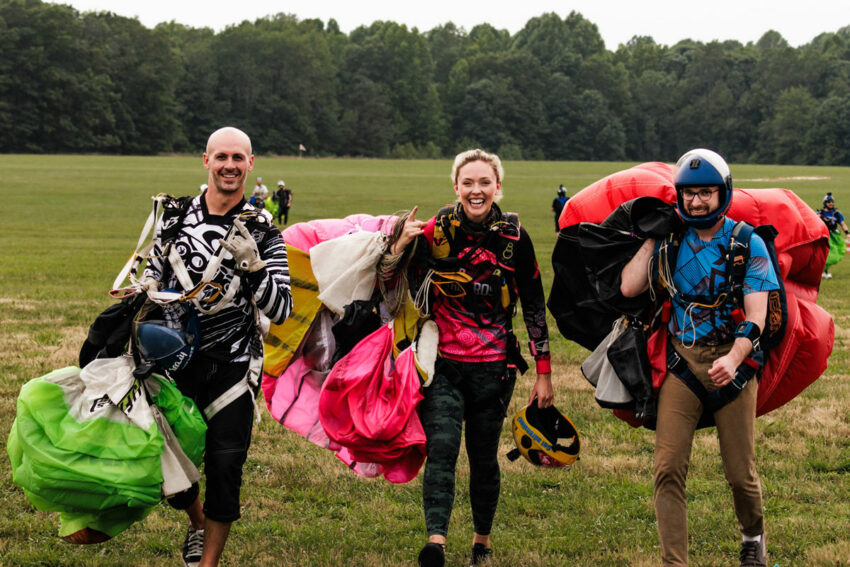Is Skydiving Tandem Safer Than Driving a Car?

Is Skydiving Tandem Safer Than Driving A Car?
Is hurtling through the sky at warp speeds with nothing but yourself (or a very skilled instructor) and a parachute less risky than the daily activity of driving? You betcha! And, that’s not our opinion – that’s based on fact. As you’ll read below, the United States Parachute Association (aka the USPA; our awesome and internationally-renowned governing body) annually reports safety statistics that provide a lot of positive food for thought.
Is skydiving safer than driving, for real, for real? Statistically, yes! Yep, you read that right. Note that we’re not saying that skydiving is safe – it’s an extreme sport, after all! Skydiving is all about calculated risk. In this article, we’ll address some commonly-expressed fears and apprehensions about flying versus driving safety, dive into some of the USPA statistics, and get you pumped to skydive.
Debunking The Myth: Is Driving More Dangerous Than Flying?
Take a minute to ponder this: the perception of safety is not the reality of risk. Read it again!
A lot of people would say the odds of dying in a car crash vs plane are a nonstarter – of course the car is safer. Nope! That’s a false perception we carry because we feel safe in our cars: we’re in control, cocooned in our highly-designed interior, seatbelt secured, and windshield clear. When we fly in a plane, we’re not at all in control and every bump and sound makes us uneasy.
So, for many it stands to reason that when we skydive, and it’s just us and the sky, we’re out of control and at the mercy of the wind. Skydiving is an unnatural act, and it’s natural to feel a little worrisome about it at first! But rest assured: skydiving equipment and technology is extremely sophisticated and not only do we have a lot of control, but we also have options in the event something goes wrong during the jump.
What Are The Odds Of Dying Skydiving?
Talking about the probability of dying skydiving is a bit grim, we know, but it’s important to understand the reality behind the perception.
OK, back to the question at hand: is flying really safer than driving? To the average person, safety is synonymous with seatbelts and slow speeds. However, the chances of dying skydiving vs in a car accident are not even in the same ballpark. The math is mathing – it doesn’t lie!
The USPA has been documenting skydiving safety statistics since the 60s. In 2023, the sport of skydiving saw a total of 10 fatalities out of approximately 3.65 million jumps. That translates to 0.27 deaths for every 100,000 skydives, or 1 in 370,000. We’ll get into car-related stats below, but first:
What is the cause of most skydiving accidents?
Skydiving accidents typically happen for one of two reasons: human error or equipment malfunction. The vast majority of skydiving accidents happen due to human error, or rather, falling into complacency. Skydivers have adopted a community-wide mindset: The learning never stops. Sadly, being overly confident and pushing back against this mentality is dangerous, and experienced skydivers can be tempted to push beyond their limits.
It’s paramount to keep a safety-oriented mindset at the forefront to ensure fun skydives for everyone. Remember: your ego is not your amigo!
How many parachutes fail a year?
According to the USPA, 12% of USPA members (meaning, licensed skydivers or students pursuing their license) used their reserve parachute in 2023. Reserves are secondary, or back-up, parachutes and are equipped inside every single skydiving rig. Licensed skydivers are typically obsessed with practicing EPs (Emergency Procedures) and cutting away a main parachute is not the big deal that it sounds like to the first-timer.
How Safe Is Skydiving Compared To Other Activities?
You’re actually more likely to bite the big one from eating than you are skydiving, as the chances of passing away from choking are 1 in 2,482! Similarly, the chance of succumbing to a simple fall is 1 in 92! That means that falling from the sky is statistically less risky than a fall on the ground!
How much safer is a plane than a car?
Is driving more dangerous than flying, for real? Yep. The United States Department of Transportation estimated that over 40,000 people died in motor vehicle crashes in 2023 which, according to the National Safety Council, was about 1 in 93. This is much (MUCH) higher than the chances of succumbing to, or even getting hurt, from a skydiving accident. (Reminder: 1 in 370,000.)
Just like the automotive industry, the skydiving industry is constantly making improvements to keep safety front and center. As already mentioned, the technology of the skydiving world is advanced, and our training requirements are stringent and ongoing – we are constantly pressing forward to be the best.
What Is The Safest Form Of Skydiving?
Statistically, it’s tandem skydiving! Tandem skydiving is super simple compared to ripping it solo – it allows complete novices to experience the thrill and freedom of a jump with minimal prior training.
So how is it less risky? Well, tandem instructors are highly-trained and experienced professionals who have a minimum of 500 jumps (and oftentimes more like thousands, or even tens of thousands of skydives!). Allowing a tandem instructor to handle the nitty-gritty of the jump is a super smart decision from a safety point of view!
What’s more, tandem skydiving fatalities are highly irregular. In 2023, there were zero tandem skydiving fatalities reported by the USPA, and in the 10 years prior, the average was 1 in 500,000 tandem jumps.
We hope this newfound knowledge will empower you to take the leap – or to continue with confidence in your jumping journey. Please contact us with any further questions or concerns – we’re here to support you! And when you’re ready to take to the skies, book your skydive! We can’t wait to jump with you.



